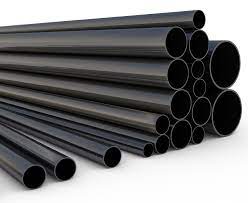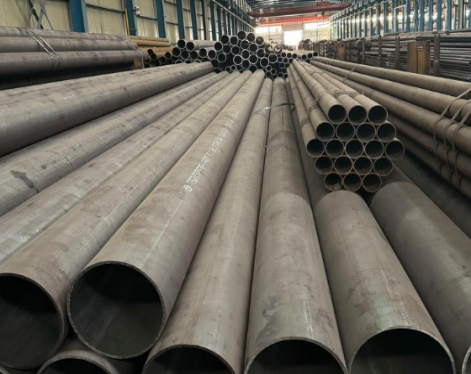1.What is Schedule 80 black steel pipe?
Schedule 80 black steel pipe refers to a specific type of steel pipe with a high wall thickness and a black finish. The term "Schedule 80" relates to the pipe's wall thickness, indicating that it has thicker walls compared to pipes with lower schedule numbers, such as Schedule 40.
The designation "black steel" indicates that the pipe is constructed from carbon steel and has a black coating applied to its surface. This black coating serves as a protective layer against corrosion and rust. Schedule 80 black steel pipes are commonly used in industrial applications, including high-pressure fluid and gas transmission, structural support, and other heavy-duty uses where the thicker walls provide increased strength and durability.

Overall, Schedule 80 black steel pipes are known for their robust construction and ability to withstand high-pressure and heavy-duty applications, making them valuable components in various industrial and commercial sectors.
2.What is the thickness of Schedule 80 black steel pipe?
The thickness of Schedule 80 black steel pipe varies depending on the nominal size. However, in general, for common nominal sizes, the wall thickness of Schedule 80 black steel pipe can range from around 0.179 inches (4.55 mm) to 0.406 inches (10.31 mm). The thickness of Schedule 40 steel pipe can vary depending on the nominal size. However, for common nominal sizes, the wall thickness of Schedule 40 steel pipe typically ranges from about 0.068 inches (1.73 mm) to 0.344 inches (8.74 mm). It's important to note that specific measurements may vary based on manufacturing standards and regional specifications.
3.ls Schedule 80 black pipe thinner than Schedule 40 black pipe?
No, Schedule 80 black pipe is thicker than Schedule 40 black pipe. The schedule numbers (e.g., 40 and 80) for steel pipes denote the wall thickness of the pipe. In this context, Schedule 80 has a thicker wall compared to Schedule 40. Therefore, Schedule 80 black pipe is thicker and can withstand higher pressures than Schedule 40 black pipe.
4.What is stronger Schedule 40 or 80 black steel pipe?
Schedule 80 black steel pipe is stronger than Schedule 40 black steel pipe. The schedule numbers (e.g., 40 and 80) for steel pipes indicate the wall thickness of the pipe. As a result, Schedule 80 black steel pipe has a thicker wall compared to Schedule 40, which makes it capable of withstanding higher pressures and supporting heavier loads. Therefore, in applications where strength and pressure resistance are critical factors, Schedule 80 black steel pipe is preferred over Schedule 40.
5.What is Schedule 80 balck steel pipe used for?
Schedule 80 black steel pipe is commonly used in applications that require higher pressure handling and structural strength. Due to its thicker walls, Schedule 80 black steel pipe is well-suited for high-pressure fluid and gas transmission systems, as well as industrial processes where heavy-duty performance is necessary. It is often employed in industrial settings, such as refineries, chemical plants, manufacturing facilities, and oil and gas infrastructure. Additionally, it is used in structural applications, particularly in areas where increased load-bearing capacity and durability are essential.
Schedule 80 black steel pipe refers to a specific type of steel pipe with a high wall thickness and a black finish. The term "Schedule 80" relates to the pipe's wall thickness, indicating that it has thicker walls compared to pipes with lower schedule numbers, such as Schedule 40.
The designation "black steel" indicates that the pipe is constructed from carbon steel and has a black coating applied to its surface. This black coating serves as a protective layer against corrosion and rust. Schedule 80 black steel pipes are commonly used in industrial applications, including high-pressure fluid and gas transmission, structural support, and other heavy-duty uses where the thicker walls provide increased strength and durability.

Overall, Schedule 80 black steel pipes are known for their robust construction and ability to withstand high-pressure and heavy-duty applications, making them valuable components in various industrial and commercial sectors.
2.What is the thickness of Schedule 80 black steel pipe?
The thickness of Schedule 80 black steel pipe varies depending on the nominal size. However, in general, for common nominal sizes, the wall thickness of Schedule 80 black steel pipe can range from around 0.179 inches (4.55 mm) to 0.406 inches (10.31 mm). The thickness of Schedule 40 steel pipe can vary depending on the nominal size. However, for common nominal sizes, the wall thickness of Schedule 40 steel pipe typically ranges from about 0.068 inches (1.73 mm) to 0.344 inches (8.74 mm). It's important to note that specific measurements may vary based on manufacturing standards and regional specifications.
3.ls Schedule 80 black pipe thinner than Schedule 40 black pipe?
No, Schedule 80 black pipe is thicker than Schedule 40 black pipe. The schedule numbers (e.g., 40 and 80) for steel pipes denote the wall thickness of the pipe. In this context, Schedule 80 has a thicker wall compared to Schedule 40. Therefore, Schedule 80 black pipe is thicker and can withstand higher pressures than Schedule 40 black pipe.
4.What is stronger Schedule 40 or 80 black steel pipe?
Schedule 80 black steel pipe is stronger than Schedule 40 black steel pipe. The schedule numbers (e.g., 40 and 80) for steel pipes indicate the wall thickness of the pipe. As a result, Schedule 80 black steel pipe has a thicker wall compared to Schedule 40, which makes it capable of withstanding higher pressures and supporting heavier loads. Therefore, in applications where strength and pressure resistance are critical factors, Schedule 80 black steel pipe is preferred over Schedule 40.
5.What is Schedule 80 balck steel pipe used for?
Schedule 80 black steel pipe is commonly used in applications that require higher pressure handling and structural strength. Due to its thicker walls, Schedule 80 black steel pipe is well-suited for high-pressure fluid and gas transmission systems, as well as industrial processes where heavy-duty performance is necessary. It is often employed in industrial settings, such as refineries, chemical plants, manufacturing facilities, and oil and gas infrastructure. Additionally, it is used in structural applications, particularly in areas where increased load-bearing capacity and durability are essential.









